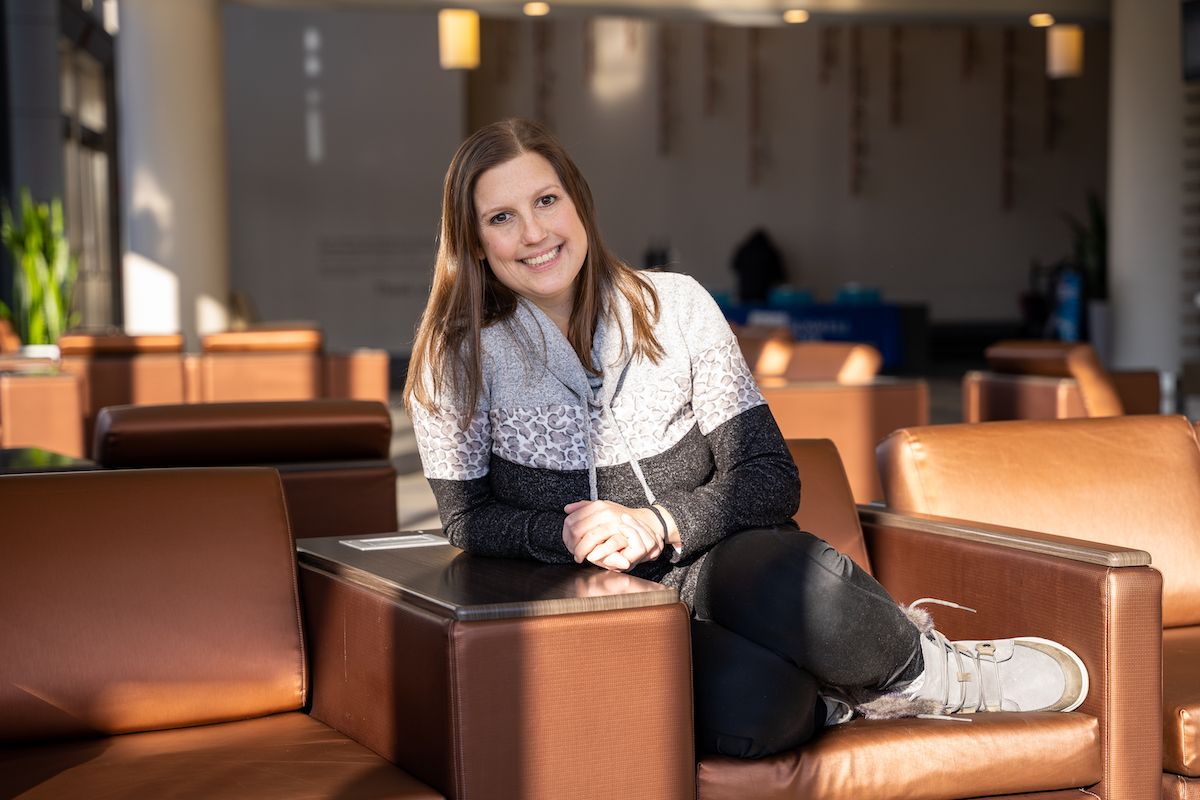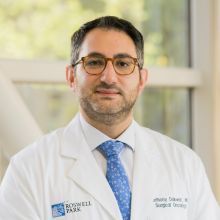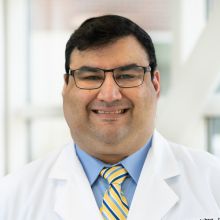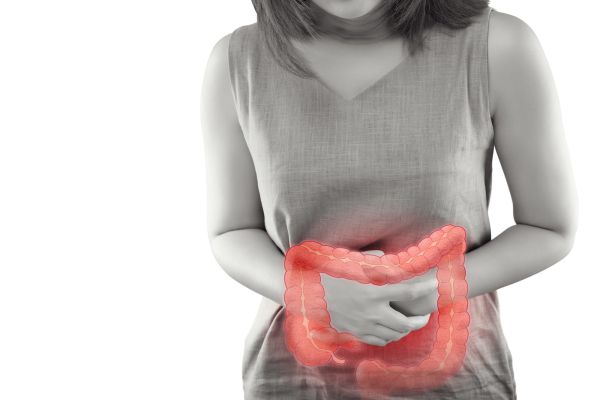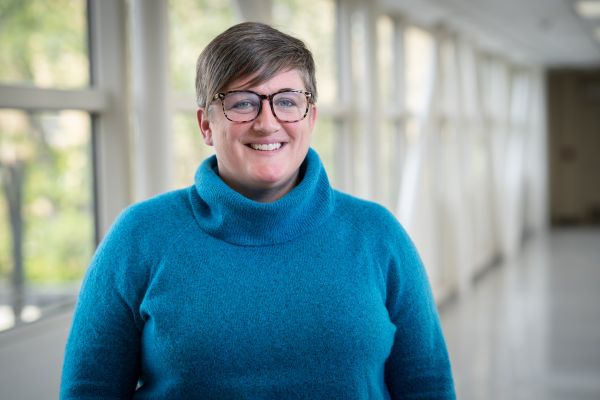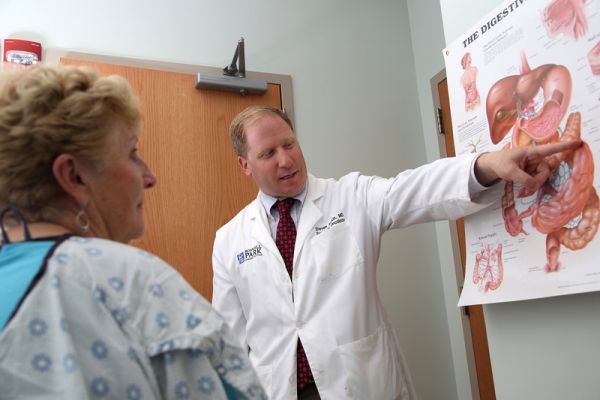In January 2020, Stefanie and Joe Wutz had just had their first child, a little girl they named Nora. “I was so happy; I'm happily married and was blessed to be a stay-at-home mom,” Stefanie says.
Almost exactly one year later, at age 31, Stefanie found herself in excruciating pain. She is used to pain: At 14 years old, she was diagnosed with Crohn's disease, causing chronic inflammation of her entire gastrointestinal (GI) tract. “For 18 years now, I’ve worked with a GI specialist, taken anti-inflammatory medicine, had colonoscopies and paid careful attention to diet, exercise and stress reduction. Even so, I've had plenty of painful GI flare-ups over the years,” Stefanie says.
But this new pain was different, she recalls. “My GI doctor determined that I had a rectal abscess, caused by the Crohn’s disease. A colorectal surgeon drained the abscess, and in a follow-up visit, he discovered that I had a rectal tumor. Surgery and treatment were planned, but, on my own, I felt like I needed to go to the cancer experts at Roswell Park for a second opinion.”
Multidisciplinary, team approach was essential
That second opinion turned out to be the first of the many times Stefanie appreciated the individualized, multidisciplinary care she got from the team of experts at Roswell Park Comprehensive Cancer Center.
“The first doctor I met was colorectal surgeon Anthony Dakwar, MD,” she says. “He was great. He explained that, even though I am relatively young, I had a higher risk for colorectal cancer because of my Crohn’s disease, a type of inflammatory bowel disease (IBD). He had already reviewed my CT scans and medical history, confirmed that I had rectal cancer and clearly explained a treatment plan to me and my husband.”
The path forward for Stefanie would require several different types of therapy. “The treatment plan for IBD-related rectal cancer, especially in younger adults, is usually aggressive, starting with both chemotherapy and radiation to shrink the tumor(s), followed by surgery to remove any diseased areas, and then follow-up with additional chemotherapy,” says Dr. Dakwar.
Steps to preserve fertility
Before Stefanie started any treatment, Dr. Dakwar and medical oncologist Deepak Vadehra, MD, explained that both chemotherapy and radiation therapy could affect her ability to become pregnant again. “My husband and I definitely want to have more children, so we were referred to Denise Rokitka, MD, MPH, who directs Roswell Park’s Oncofertility program, where we learned about our options,” she says. “I decided to forgo radiation completely so I could pursue in-vitro fertilization (IVF), and then begin chemotherapy once I had completed the IVF process. Dr. Vadehra and Dr. Rokitka collaboratively determined this plan would work for me. Dr. Rokitka then connected us with an IVF clinic and we now have five embryos in long-term storage, for when the time is right.”
Young Adult Program at Roswell Park
Our Young Adult Program offers nationally designated comprehensive cancer care, plus support and services specifically designed to help you and your family now — and for years to come.
Learn MoreRevising her treatment plan
Next, Stefanie started chemotherapy under the guidance of Dr. Vadehra. “I lasted for only one session – a total of three weeks. My body just couldn’t tolerate it,” she says.
“As we do for all patients, our team of medical and GI surgical oncologists met to review her case and revise Stefanie’s care plan, based on her unique conditions," says Dr. Dakwar. “We determined that we should proceed with the surgery and then administer a different mix of chemotherapy afterwards, tailored specifically for Stefanie, that she could better tolerate."
In January 2022, Dr. Dakwar removed four feet of Stefanie's diseased colon, including the rectal tumor, and several lymph nodes. “I knew before the surgery that I would need to use an ostomy bag afterward, and one of Roswell Park’s certified wound, ostomy and continence nurses explained the details of how that would work,” Stefanie says. “I spent five days in the hospital and the ostomy nurses helped me learn to care for my stoma and ostomy bag before I went home.”
Now a month post-surgery, Stefanie is healing quickly. "A nurse comes to my house to make sure I am doing well and using the ostomy bag correctly. I love to swim, and my nurse has assured me that I will be able to do so, even with the bag. The bag is held flat by a belt and can be discreetly placed under a bathing suit or clothes," she says. Stefanie has also joined a Facebook support group for Crohn’s patients and another Facebook group for people with ostomies and stomas. “I've learned that it's important to stay positive, to ask questions and to surround yourself with people who can offer solid support.”
A better quality of life
What’s ahead for Stefanie, now? She continues with her cancer treatment and recently started her new mix of chemotherapy which she's tolerating well. Since there can be a hereditary component to some colorectal cancers, Stefanie recently returned to Roswell Park for genetic screening. “I’m waiting for my results right now. These will be important, as they may impact future treatments for me and they may provide clues to prevent health issues in my daughter and any other children I may have.”
Though she will need to use the ostomy bag for the rest of her life, Stefanie’s attitude is positive. “Honestly, I can live with that. I feel great and, with the surgery completed, my quality of life is much better now than it was when I was in so much pain from my IBD and abscess. I can’t wait for my surgery scars to heal so that I can pick up Nora again and take her to her Mommy and Me dance class. I’m excited for my family and I to go to the lake this summer to swim, go boating and so much more. I am so grateful that I have such a great team of experts and resources nearby at Roswell Park.”
Editor’s Note: Cancer patient outcomes and experiences may vary, even for those with the same type of cancer. An individual patient’s story should not be used as a prediction of how another patient will respond to treatment. Roswell Park is transparent about the survival rates of our patients as compared to national standards, and provides this information, when available, within the cancer type sections of this website.
